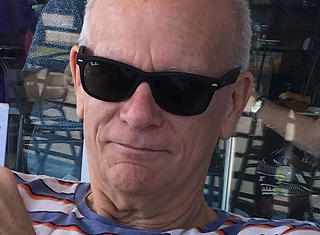He hovers on the surface of the water, face down, taking in huge breaths and then vigorously expelling the air through a snorkel. After about a minute, he vacuums his lungs full, juts his butt and flippers upward, and then shoots straight down into the inky abyss.
Destination: 75 feet to a shipwreck called the Blackthorn about 20 miles west of Clearwater. Mission: Shoot big fish. Cobia. Grouper. Tuna. Snapper.
He glides downward, barely kicking, aided by a 10-pound weight strapped around his waist with a frayed nylon belt. There's a speargun in his right hand.
He is 26-year-old Noel Karcher. His brother Dane, 28, hovers nearby. They are the preeminent freedive spearfisherman in the Bay area. It's a sport that requires stamina, concentration, guts and more.
"They're both certifiable," says Ian Beckles, a friend of the Karchers who's a host on local sports-talk radio. "Anybody who dives into that much water just holding their breath, spears a bloody fish and brings it to the top has got to be crazy."
Noel reaches the bottom of the Gulf in about five seconds. He sits there as motionless as possible — better to conserve oxygen and not spook his prey. He blends in, becomes one with the fish, waiting stealthily for a trophy to swim by.
Thirty seconds down. Forty-five. Noel's not like the rest of us. We drop underwater, tense, almost immediately thinking about our need for oxygen. We look toward the top to make sure we can make it back. Then we rocket upward, slightly panicked. We break the water and gulp air, relieved.
You can't hunt that way. Noel keeps his mind and body calm. He has an internal clock that tells him when he absolutely, positively must follow the sun shafts toward the surface. He's as comfortable at 75 feet as Liz Taylor is at a makeup counter.
Noel spots a decent-size cobia, considers taking a shot. Then out of the corner of his eye he sees the ghost-like visage of one big-ass fish. He waits, aims, fires. The spear, tethered to the gun, cuts 20 feet through the water. It's a hit, but a gut shot, not ideal. The fish freaks out and heads for the wreck. Noel pulls at the line, fighting gamely to steer it toward the top, but the wounded fish disappears into the mass of corroded metal and sharp edges. Then the line goes limp in Noel's hands. The fish, a 3-foot metal shaft through its stomach, takes refuge in the cavernous submerged ship.
Noel scurries to daylight, breaks the surface, and hollers, "Cubera snapper! A big one."
Last August, noel and dane Karcher set out for Cape Hatteras, N.C., to compete in the Riffe OMER Blue Water Spearfishing Tournament, one of the top competitions in the world. It was the brothers' first major tourney. Their mother, Liz Karcher, scared up about $2,500 to finance the sojourn.
The unknowns from St. Pete joined a field that included divers from the U.S., Brazil, Puerto Rico, Turkey and other countries. Most competitors donned sleek outfits emblazoned with the logos of their sponsors. Noel and Dane wore old shorts.
"All these other divers knew the size of the shafts and the spearheads, talking three-eighths this and half-inch that," Noel recalls. "I was like, 'I don't know all that. Just give me a gun and a mask.'"
The Friday-through-Sunday tournament called for contestants to submit three fish, one each from a list of 10 different species. The diver with the most total weight would win. Assigned to boats, they dove from 6:30 a.m. to 4:30 p.m. each day.
Noel, the rookie, won. He snagged a 39-pound African pompano, a 35-pound amberjack and a 15-pound cobia for a total of 89 pounds, 10 ahead of a Brazilian hunter.
When Noel got out of the blocks by spearing the pompano on the second day, Dane took on a support role. Early in the tournament, Noel had a large cobia in his sights when a Brazilian diver swooped in, took a wayward shot and sent the fish scurrying away. The Karcher brothers realized that the Brazilian was willing to play dirty pool. Early on the last day, Noel landed the cobia to put him in the lead. Then Dane spent several hours cutting off the Brazilian to preserve the win. Even so, Dane landed a 34-pound amberjack at the last dive spot to claim 10th place.
A few months later, Liz Karcher was talking about Noel's victory with a representative from OMER, a leading manufacturer of dive gear and tournament co-sponsor. "He said, 'You don't understand. It's like some kid coming out of the backwoods with a broomstick and beating Tiger Woods,'" Liz recounts.















